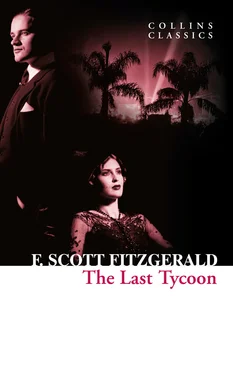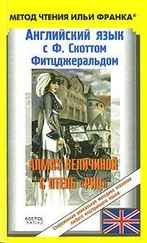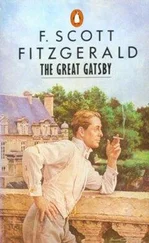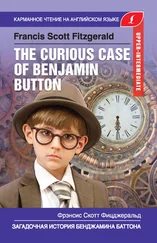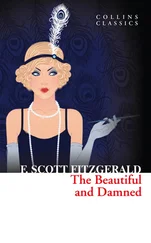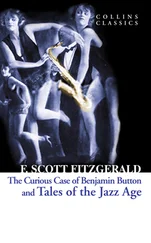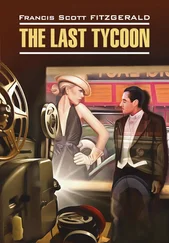Stahr paused. He picked up his keys and put them in his pocket.
“Go on,” said Boxley smiling. “What happens?”
“I don’t know,” said Stahr. “I was just making pictures.”
Boxley felt he was being put in the wrong.
“It’s just melodrama,” he said.
“Not necessarily,” said Stahr. “In any case, nobody has moved violently or talked cheap dialogue or had any facial expression at all. There was only one bad line, and a writer like you could improve it. But you were interested.”
“What was the nickel for?” asked Boxley evasively.
“I don’t know,” said Stahr. Suddenly he laughed. “Oh, yes—the nickel was for the movies.”
The two invisible attendants seemed to release Boxley. He relaxed, leaned back in his chair and laughed.
“What in hell do you pay me for?” he demanded. “I don’t understand the damn stuff.”
“You will,” said Stahr grinning, “or you wouldn’t have asked about the nickel.”
A dark saucer-eyed man was waiting in the outer office as they came out.
“Mr. Boxley, this is Mr. Mike Van Dyke,” Stahr said. “What is it, Mike?”
“Nothing,” Mike said. “I just came up to see if you were real.”
“Why don’t you go to work?” Stahr said. “I haven’t had a laugh in the rushes for days.”
“I’m afraid of a nervous breakdown.”
“You ought to keep in form,” Stahr said. “Let’s see you peddle your stuff.” He turned to Boxley: “Mike’s a gag man—he was out here when I was in the cradle. Mike, show Mr. Boxley a double wing, clutch, kick and scram.”
“Here?” asked Mike.
“Here.”
“There isn’t much room. I wanted to ask you about—”
“There’s lots of room.”
“Well,” he looked around tentatively. “You shoot the gun.”
Miss Doolan’s assistant, Katy, took a paper bag, blew it open.
“It was a routine,” Mike said to Boxley, “—back in the Keystone days.” He turned to Stahr: “Does he know what a routine is?”
“It means an act,” Stahr explained. “Georgie Jessel talks about ‘Lincoln’s Gettysburg routine.’”
Katy poised the neck of the blown-up bag in her mouth. Mike stood with his back to her.
“Ready?” Katy asked. She brought her hands down on the side. Immediately Mike grabbed his bottom with both hands, jumped in the air, slid his feet out on the floor one after the other, remaining in place and flapping his arms twice like a bird—
“Double wing,” said Stahr.
—and then ran out the screen door which the office boy held open for him and disappeared past the window of the balcony.
“Mr. Stahr,” said Miss Doolan, “Mr. Hanson is on the phone from New York.”
Ten minutes later he clicked his dictograph, and Miss Doolan came in. There was a male star waiting to see him in the outer office, Miss Doolan said.
“Tell him I went out by the balcony,” Stahr advised her.
“All right. He’s been in four times this week. He seems very anxious.”
“Did he give you any hint of what he wanted? Isn’t it something he can see Mr. Brady about?”
“He didn’t say. You have a conference coming up. Miss Meloney and Mr. White are outside. Mr. Broaca is next door in Mr. Reinmund’s office.”
“Send Mr. Roderiguez in,” said Stahr. “Tell him I can see him only for a minute.”
When the handsome actor came in, Stahr remained standing. “What is it that can’t wait?” he asked pleasantly.
The actor waited carefully till Miss Doolan had gone out. “Monroe, I’m through,” he said. “I had to see you.”
“Through!” said Stahr. “Have you seen Variety ? Your picture’s held over at Roxy’s and did thirty-seven thousand in Chicago last week.”
“That’s the worst of it. That’s the tragedy. I get everything I want, and now it means nothing.”
“Well, go on, explain.”
“There’s nothing between Esther and me anymore. There never can be again.”
“A row.”
“Oh, no—worse—I can’t bear to mention it. My head’s in a daze. I wander around like a madman. I go through my part as if I was asleep.”
“I haven’t noticed it,” said Stahr. “You were great in your rushes yesterday.”
“Was I? That just shows you nobody ever guesses.”
“Are you trying to tell me that you and Esther are separating.”
“I suppose it’ll come to that. Yes—inevitably—it will.”
“What was it?” demanded Stahr impatiently. “Did she come in without knocking?”
“Oh, there’s nobody else. It’s just—me. I’m through.”
Stahr got it suddenly.
“How do you know?”
“It’s been true for six weeks.”
“It’s your imagination,” said Stahr. “Have you been to a doctor?”
The actor nodded.
“I’ve tried everything. I even—one day in desperation I went down to—to Claris. But it was hopeless. I’m washed up.”
Stahr had an impish temptation to tell him to go to Brady about it. Brady handled all matters of public relations. Or was this private relations. He turned away a moment, got his face in control, turned back.
“I’ve been to Pat Brady,” said the star, as if guessing the thought. “He gave me a lot of phoney advice and I tried it all, but nothing doing. Esther and I sit opposite each other at dinner, and I’m ashamed to look at her. She’s been a good sport about it, but I’m ashamed. I’m ashamed all day long. I think Rainy Day grossed twenty-five thousand in Des Moines and broke all records in St. Louis and did twenty-seven thousand in Kansas City. My fan mail’s way up, and there I am afraid to go home at night, afraid to go to bed.”
Stahr began to be faintly oppressed. When the actor first came in, Stahr had intended to invite him to a cocktail party, but now it scarcely seemed appropriate. What would he want with a cocktail party with this hanging over him? In his mind’s eye he saw him wandering haunted from guest to guest with a cocktail in his hand and his grosses up twenty-seven thousand.
“So I came to you, Monroe. I never saw a situation where you didn’t know a way out. I said to myself: even if he advises me to kill myself, I’ll ask Monroe.”
The buzzer sounded on Stahr’s desk—he switched on the dictograph and heard Miss Doolan’s voice.
“Five minutes, Mr. Stahr.”
“I’m sorry,” said Stahr. “I’ll need a few minutes more.”
“Five hundred girls marched to my house from the high school,” the actor said gloomily, “and I stood behind the curtains and watched them. I couldn’t go out.”
“You sit down,” said Stahr. “We’ll take plenty of time and talk this over.”
In the outer office, two members of the conference group had already waited ten minutes—Wylie White and Jane Meloney. The latter was a dried-up little blonde of fifty about whom one could hear the fifty assorted opinions of Hollywood—“a sentimental dope”, “the best writer on construction in Hollywood”, “a veteran”, “that old hack”, “the smartest woman on the lot”, “the cleverest plagiarist in the biz”; and, of course, in addition she was variously described as a nymphomaniac, a virgin, a pushover, a Lesbian and a faithful wife. Without being an old maid, she was, like most self-made women, rather old maidish. She had ulcers of the stomach, and her salary was over a hundred thousand a year. A complicated treatise could be written on whether she was “worth it” or more than that or nothing at all. Her value lay in such ordinary assets as the bare fact that she was a woman and adaptable, quick and trustworthy, “knew the game” and was without egotism. She had been a great friend of Minna’s, and over a period of years Stahr had managed to stifle what amounted to a sharp physical revulsion.
Читать дальше
